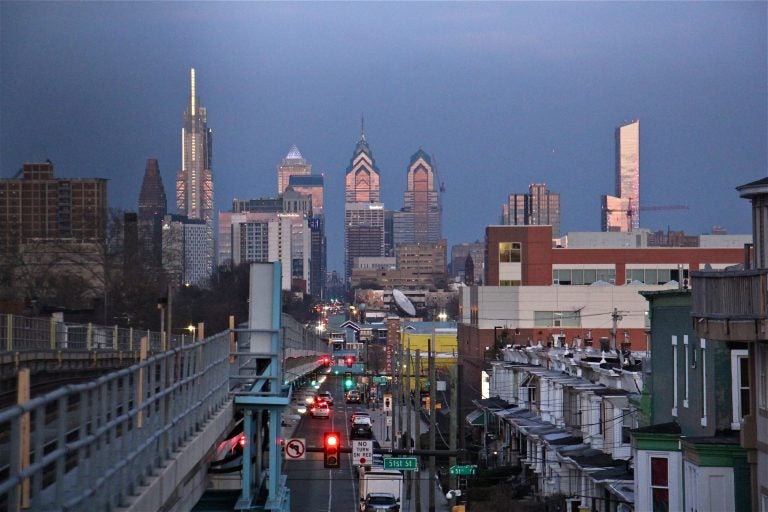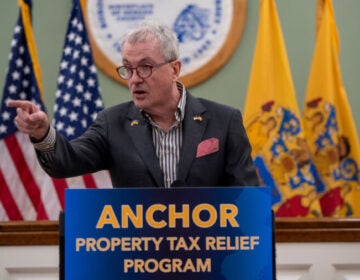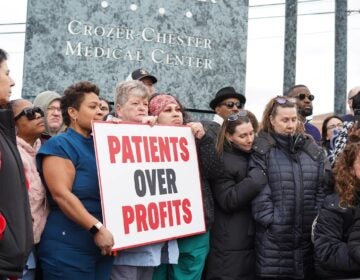Pew: Philadelphians pay more taxes than most big city residents
A new Pew report found Philly’s reputation as a heavy taxer is valid. The reasons why are complicated.

A view of the Philadelphia skyline from the 52nd Street station on the Market-Frankford elevated line in West Philadelphia. (Emma Lee/WHYY)
This story originally appeared on PlanPhilly.
—
Philadelphians fork over more money per capita in taxes than residents of all but four major U.S. cities, according to a new report from the Pew Charitable Trusts’ Philadelphia Research Initiative.
The analysis, called “The Cost of Local Government in Philadelphia,” explored the variety and amount of taxes Philadelphians pay compared to the 30 largest cities in the country by population. Based on budget figures from 2015, the report did not include more recent revenue from Mayor Jim Kenney’s soda tax — which could fizzle if a recently introduced City Council bill succeeds.
“We wanted to see, one, if Philadelphia’s reputation as a city with a high tax burden was valid, and two, what spending and other factors were driving that tax burden,” said Philadelphia Research Initiative project director Larry Eichel.
What they found? One, Philly’s reputation as a heavy taxer is valid. And two, well, it’s complicated.
A variety of geographic, social and governmental features push Philadelphia to spend on its residents. The city’s modest tax base — the amount of wealth and resources a city can tap into — also contributes to higher tax rates. The report included revenues and costs associated with the school district, city government, and local agencies, such as SEPTA.
Key findings
- We’re in the top 10 in terms of both taxing and spending. In dollars and cents, that means Philadelphia takes in $6,303 per person. Of that, a little less than half, $3,004, comes from taxes. The rest of the money raised comes from a combination of state and federal aid, fees for service and “miscellaneous revenue.” In turn, the city spends $6,209 per resident. Only New York, San Francisco, Boston, and Denver –- all wealthier cities than Philadelphia — collected more in taxes per capita.
- Philadelphia does the jobs of both a city and a county. Many U.S. cities exist within a separate county government entity, which taxes both the city and its surrounding suburbs to pay for services. Consolidated cities such as Philadelphia do it all without the financial assistance that can come from taxing wealthier areas outside the city. Pennsylvania also delegates responsibility for many services that it partially funds to local governments, forcing those local governments to cover the rest.
- Crime and high poverty drive up the need for services. Philadelphia has the highest poverty rate among the top 10 biggest cities in the U.S. Among the cities compared by this study, it ranked fourth. That contributes to the high demand for some services that a county government (see above) would normally administer — public health, welfare, courts, jails. “The impact of poverty on local taxes is especially significant in social programs” that are not fully funded by state or federal dollars, according to the report, pointing to the $59 million Philadelphia spent on health centers and $81 million on programs combating homelessness in 2015.
- The city’s tax base is “weak.” Major tax bases are property, personal income and sales. In each of these categories, Philadelphia has fewer dollars to pull from in each of these categories.
- Philly has a potpourri of taxes, some of which are much less lucrative than in other cities. The city’s “unusual tax portfolio,” consists of property, sales, individual income, and corporate income taxes — a rare combination among comparison cities. It also receives far less than average from property taxes — 25 percent of the city’s tax revenue, versus the median of 65 percent in the group.
An argument to ‘grow the pie’
These findings don’t suggest any particular tax policy change, according to the Economy League’s Jeff Hornstein, although Philadelphia could explore more collaborations with area counties.
“Denver got its surrounding counties to pay for a whole bunch of shared services, starting with arts and culture and leading into transit,” he said.
With structural inequities at the base of Philadelphia’s high need and high taxation, the focus should be on growing the economy, said Hornstein.
“The overarching point for me is the better strategy is to grow the pie, shifting the deck chairs has never been a winning strategy,” he said.
WHYY is your source for fact-based, in-depth journalism and information. As a nonprofit organization, we rely on financial support from readers like you. Please give today.






